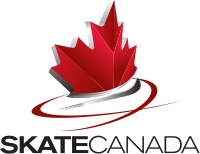Skate Canada
 | |
| Sport | Figure skating |
|---|---|
| Jurisdiction | Canada |
| Founded | 1887 |
| Affiliation | International Skating Union |
| Headquarters | 261 – 1200 St. Laurent Blvd. Box 15, Ottawa, ON, K1K 3B8, CANADA |
| President | Leanna Caron |
| Official website | |
|
www | |
|
| |
Skate Canada is the national governing body for figure skating in Canada, recognized by the International Skating Union and the Canadian Olympic Committee. It organizes the annual Canadian Figure Skating Championships, the fall Skate Canada International competition, as well as other national and international skating competitions in Canada.
Overview
The organization was founded in 1914 as "The Figure Skating Department of the Amateur Skating Association of Canada". In 1939, it changed its name to the "Canadian Figure Skating Association" (CFSA). The current name of "Skate Canada" was adopted in 2000 for consistency with the names of other national sports organizations in Canada.
Skate Canada claims to be "the oldest and largest figure skating organization in the world".[1] The vast majority of members are not elite competitors, but recreational skaters.
History
- 1887 - Amateur Skating Association of Canada for speed and figure skating is formed by Louis Rubenstein of Montreal's Victoria Skating Club.
- 1911 - First artificial ice rink is built in Vancouver.
- 1914 - First official Canadian Figure Skating Championships is held in Ottawa.
- 1914 - The Figure Skating Department of the Amateur Skating Association of Canada is formed to promote skating in Canada.
- 1928 - First year that Canadians participate at a World Championship.
- 1932 - For the first time, Canada hosts the World Figure Skating Championships (in Montreal).
- 1939 - Renamed to become the Canadian Figure Skating Association.
- 1947 - The CFSA joins the International Skating Union and establishes a national office in Ottawa.
- 1958 - Charles H. Cumming is hired as the CFSA's first full-time employee.
- 1963 - First CFSA logo is developed.
- 1973 - Skate Canada International is introduced as a major international event (first location: Calgary).
- 1981 - For the first time, Canada hosts the World Junior Championships (in London).
- 1981 - The concept of a National Team is conceived.
- 1990 - The last figures are skated in international competition at the 1990 World Championships in Halifax.
- 1990 - The Canadian Figure Skating Hall of Fame is established and the first members inducted in a ceremony at the CFSA's annual meeting in Edmonton.
- 1990 - The CFSA implements framework for Skating Unlimited new pre-school and adult recreational programs.
- 1991 - The Junior National Team is created.
- 1995 - Canada hosts its first-ever ISU-sanctioned international precision skating event, Precision Canada International (in Toronto).
- 2000 - Canadian Figure Skating Association changes its name to Skate Canada.
Organizational structure
Skate Canada's headquarters are in Ottawa, Ontario. The organization also has 10 sectional offices which coordinate much of the local activity within their respective areas.[2]
| Section name | Abbreviation | Official website |
|---|---|---|
| British Columbia / Yukon | BC/YK | website |
| Alberta / NWT / Nunavut | AB/NT/NU | website |
| Saskatchewan | SK | website |
| Manitoba | MB | website |
| Ontario | ON | website |
| Quebec | QC | website |
| New Brunswick | NB | website |
| Nova Scotia | NS | website |
| Prince Edward Island | PE | website |
| Newfoundland and Labrador | NL | website |
Ontario formerly had four organisations, Eastern Ontario, Central Ontario, Western Ontario and Northern Ontario but they merged in 2017 to receive provincial funding.
References
- ↑ "Skate Canada – About Us – Who We Are". Skate Canada. Retrieved 25 January 2016.
- ↑ "Skate Canada – Structure – Skate Canada Sections". Skate Canada. Retrieved 25 January 2016.